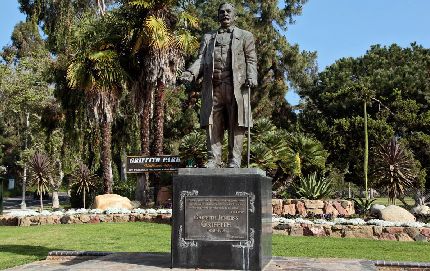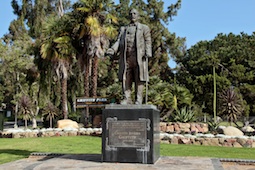Proposed Ballfields Run Afoul Of Griffith Park Vision

Creating two youth baseball fields at Crystal Springs in Griffith Park runs contary
to the benefactor's vision for the park as a place of rest for "the plain people".
photo by Tom Polito
RELATED: Is Griffith Park ready to play ball? A KPCC radio discussion of the issue with Angeles Chapter Executive Committee member and leader Joe Young and other. Give a listen.
Los Angeles has proposed constructing two new “youth” baseball fields at Crystal Springs, the area in Griffith Park just south of the Ranger Station and the Visitor Center. To this end, it has applied for a Proposition K competitive grant for a program called “L.A. for Kids.”
Pote Field is a full-size ball field already at Crystal Springs. It has a fence around it and is for use by adults only. The City Bureau of Engineering, Recreational and Cultural Facilities Program, has outlined three options.
The first two options for the youth ball fields require destruction of mature trees, including native oak and sycamore, removal of picnic tables and picnic area, removal of some parking spaces, and changing the driveway, now a loop, into a short turnaround. There will be a ball field within 10 feet of an equestrian, walking and running trail. This same trail is also part of a national historic trail, the Juan Bautista de Anza Trail, a 1,200 trail that honors Spanish settlers who journeyed from Arizona to San Francisco.
The National Park Service has awarded a grant of assistance to Friends of Griffith Park to restore the Griffith Park portion of the trail. In addition, Griffith Park in almost its entirety has been designated as a Los Angeles City Historic-Cultural Monument. Thus, there will have to be historical as well as environmental review of this project.
To get this grant, the city must prove it the proposed project will increase recreation and will be generally accessible to all. Crystal Springs is heavily used by families, most of whom do not have yards or nearby green space. Kids visiting Crystal Springs rent bikes, play catch, have birthday parties and use the area for many other\activities. It is unlikely that displacing these regular users will increase recreation. Instead, the project will invite organized baseball clubs at the expense of families from underserved communities who use the area for picnics and informal recreation. Some of the youth baseball clubs will come from affluent areas such as Toluca Lake and Hancock Park.
Option three is to explore other locations within or near Griffith Park. North Atwater Park and a portion of the Central Service Yard are alternative locations that present themselves. If kids need more baseball fields, why not put then nearby, rather than in the middle of Griffith Park? A goal of establishing a “sports complex” in the center of the park has been mentioned. Here are some of the problems with that plan:
- It subverts Colonel Griffith’s vision for the park as a place of rest for the “plain people.”
- It results in the loss of space for family picnics and informal recreation.
- It eliminates the loop for bicycle riders and walkers.
- It endangers horses and their riders with screaming kids and parents and with flying balls.
- It probably increases vehicular traffic.
- It results in destruction of maturetrees, eliminating shade and habitat.
- It further disturbs a wildlife corridor.
Finding places for ball fields near Griffith Park can lead to a win for ball-playing kids and for the park as well. Too many people cast covetous eyes on Griffith Park.
It is the largest urban wilderness park in the United States. Even so, it is not big enough to contain everything on everyone’s wish list. And the “wilderness” component of “urban wilderness” is a key element of the identity of the park.
In 1958, Van Griffith remarked that, “As I see the future, Griffith Park is going to need a guardian angel in order to survive.” Just so. Powerful interest groups are pushing for these ball fields.
Get involved
Tell L.A.’s parks leaders you want to keep the vision of Griffith Park alive and want them to site ballfields for kids near but not inside the park.
Cathie Santo Domingo, Project Manager Bureau of Engineering, Recreational and Cultural Facilities Program, 200 N. Spring St. 23rd floor, Los Angeles, CA 90012, cathie.santodomingo@lacity.org,
Jon Kirk Mukri, General Manager, City of Los Angeles Department of Recreation and Parks, 1200 West 7th Street, Los Angeles, CA 90017




Comments
Angela Colicchio (not verified)
November 18, 2013 - 1:53pm
Permalink
YOuth Baseball fields
Robert Carreno (not verified)
December 5, 2013 - 8:54pm
Permalink
Baseball fields at Crystal Springs
Add new comment